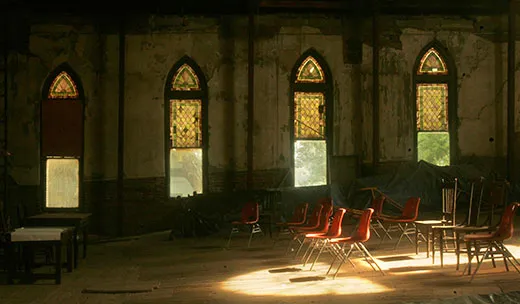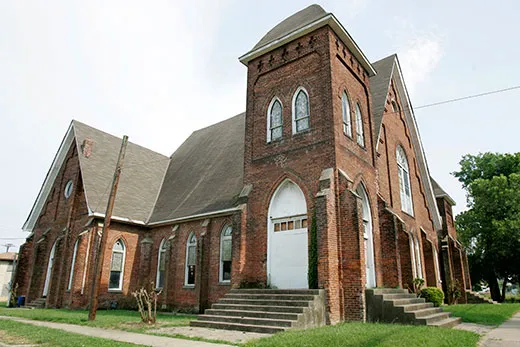Endangered Site: Centennial Baptist Church
Built by a self-taught black architect, the Arkansas church has hosted leaders in the black community for over a century
/https://tf-cmsv2-smithsonianmag-media.s3.amazonaws.com/filer/Centennial-Baptist-Church-Arkansas-631.jpg)
In 1905, the Reverend Elias Camp Morris and self-taught architect Henry James Price, both of whom had been born in slavery, built the Centennial Baptist Church in Helena, Arkansas. Its Gothic Revival style stood out in the small, delta neighborhood; the building featured square towers with brick corbelling, double-hung lancet windows and a gabled roof. In the years that followed, Centennial emerged as a center of leadership and a beacon of pride for the African American community. It hosted civil rights leaders Booker T. Washington and W.E.B Du Bois, entrepreneur Madam C.J. Walker and, more recently, Governor Bill Clinton, who visited the church in 1989 to announce a renovation plan for downtown Helena.
Today, Centennial's doors and stained glass windows are boarded up; pigeons fly in through holes in its sagging roof. A network of scaffolding dominates the nave, which is littered with construction debris. Wooden pews are stacked up around the sanctuary, and the pulpit has been removed to protect it from vandals. The last worship service here was in 1998.
"We felt it was the end of the road for the church," says Phyllis Hammonds, whose family had attended Centennial for 60 years. So Hammonds, an education consultant, created the all-volunteer E.C. Morris Foundation in 2004, which is striving to raise nearly two million dollars to restore the church and turn it into a museum or cultural center in memory of Morris. "He was the precursor to Martin Luther King," Hammonds says. "When he spoke, it was so uplifting. He was an amazing man."
Perhaps nearly forgotten today, Morris was one of the nation's most progressive African American ministers at the turn of the 20th century. Born on a Georgia plantation in 1855, he left after the Emancipation Proclamation. In 1884, he helped found the Arkansas Baptist College. Morris devoted his life to furthering the religious, political and social influence of the black community and often used Centennial as his base of operations. When regional black Baptist groups merged to form the National Baptist Convention of the U.S.A, Morris was elected its president and served 27 years. Under his leadership, the convention established a black publishing house to produce religious materials for its congregations. By 1900, the Convention represented over 60 percent of African American church members and over one-half of Sunday schools
Morris was also highly regarded outside the African American community. He served as a delegate to three Republican National Conventions and, in 1908, traveled to the Belgian Congo as President Theodore Roosevelt's emissary to investigate claims of atrocities committed against the indigenous population by the colonial government. At home, Morris was lauded as a peacemaker in 1919 after one of the worst race riots in American history erupted in Elaine, Arkansas. The riot began when an altercation at a union meeting of black sharecroppers resulted in the death of a white security officer. Rumors of a "black insurrection" spread among the white community, and the ensuing violence left hundreds of African Americans dead. The day after the rioting, Morris assured Helena's white population that the rumors of insurrection were unfounded.
In 2003, long after his death in 1922, Morris's achievements would earn Centennial a National Historic Landmark designation. "He has a legacy; it just needs to be told," says Hammonds. "We want to tell our own story, but we don't have the resources or manpower. That's the most frustrating part."
Centennial's decline can be traced to the death of the charismatic Morris, after which the church began to loose its congregation. Meanwhile, members of the Morris family—along with thousands of other African Americans—migrated to northern cities to seek opportunities. By the time the church closed its doors a decade ago, the number of parishioners had dwindled from 1,000 to 25.
So far, about a half million dollars from private donors and Arkansas preservation grants have been spent to stabilize the church's deteriorating foundation, shore up its slumping walls and make other emergency repairs. But, for now, all construction has ceased as the Morris Foundation searches for more funding.
"We get money piecemeal, and we never have enough," says Hammonds. "It's always just enough to keep it from falling down." In 2006, the church landed on Arkansas' 2006 list of Most Endangered Places, which is compiled by the state's Historic Preservation Alliance.
The church is eligible for a $300,000 grant from Save America's Treasures, a federal program, but to qualify, it must be matched with cash, donations or building materials. The Walton Family Foundation, the philanthropic branch of the Wal-Mart Corporation has shown interest in helping out but Joe Black—the senior vice president of the nonprofit group Southern Financial Partners—who represents Walton, says the church must first come up with a plan to sustain itself. "After the grant funds are depleted, how will the church maintain itself?" he asks.
E.C. Morris board president Henrietta Williams, who grew up in the church, says it will likely take five years to come up with the $2 million needed to restore the church and turn it into a cultural center. "It is something I will never give up on," she adds
Planning Your Next Trip?
Explore great travel deals
Smithsonian magazine participates in affiliate link advertising programs. If you purchase an item through these links, we receive a commission.

